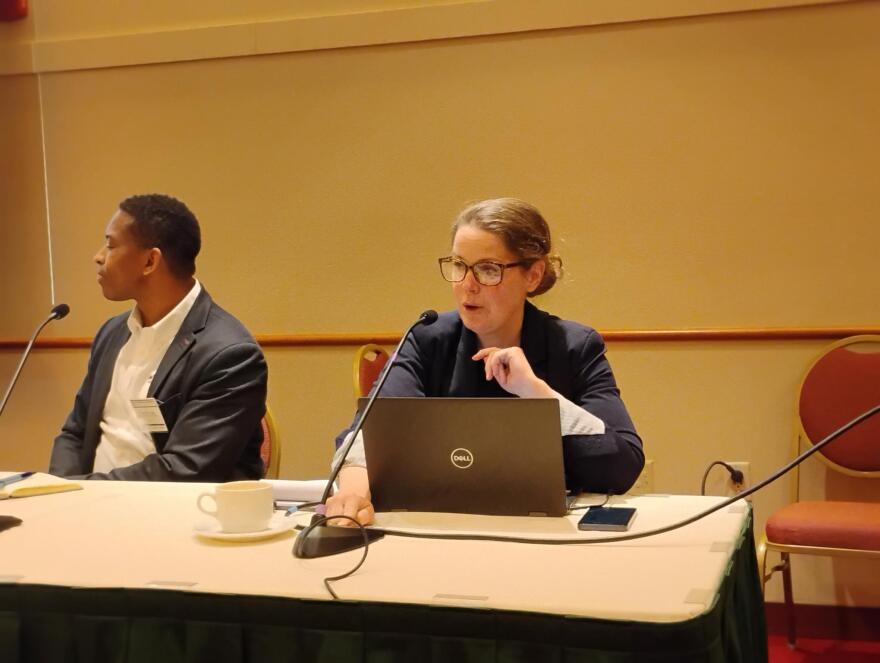We wrap up our Thin Ice series — which has been looking at shorter and warmer winters in Wisconsin.
During the series, we’ve also reported on Trump administration threats to programs that some hope would help slow climate change.
For example, there are questions about Solar for All, a program designed to bring solar energy to more low-income neighborhoods, including Milwaukee.
How it began: When President Joe Biden and Congress approved the Inflation Reduction Act, they set in motion more national programs to protect the environment and reduce fossil fuel use.
One of those programs is Solar for All. Wisconsin is set to receive $62 million to install solar panels on more rooftops in low-income areas, allowing residents of single-family or multi-family dwellings to save as much as 20% on their energy bills. The program could also establish community solar, where subscribers can reduce what they owe their electric utility.
Up until five weeks ago, Zealan Hoover was an U.S. Environmental Protection Agency official in charge of implementing EPA efforts that IRA funded. He describes who would able to sign up for Solar for All:
“One way you can qualify is if you live in one of the census tracts that are most exposed to pollution. The second way you can qualify is by having an income that is at, or below, either 200% of the federal poverty level or 80% of the area median income," Hoover says.
Hoover also says you could qualify for Solar for All if you already meet requirements for income based programs like the Supplemental Nutrition Assistance Program, SNAP.

Hoover, now a private citizen, says when President Donald Trump took office, the Republican gave an order to freeze the solar energy funding.
“It (the move) is not only illegal, but also very detrimental to the alleged policy priorities of this administration around things like reducing costs for families," Hoover tells WUWM.
The Trump Administration says the freeze is to review whether IRA programs harm the development of fossil fuels.
Federal courts have since told Trump to unlock the funding. But some states are reporting that hasn’t happened.
Either way, Hoover worries higher courts could later support Trump’s freeze of Solar for All.
Republican House Speaker Mike Johnson has said the executive branch has the right to evaluate how its agencies are operating. Other GOP officials across the U.S. say solar energy installers can continue to do well without the taxpayer-funded solar program.

But the freeze, or threat of one, is troubling to Heather Allen. She’s with Elevate—a nonprofit which works with contractors in Wisconsin and other Midwest states to retrofit affordable housing to add solar and clean energy technology.
Allen says Milwaukee is one of the cities that stand to gain from Solar for All.
“Lots of investment in Milwaukee that I would foresee. And in Northern Wisconsin, rural Wisconsin. It would really be across the state, and really drive clean energy job growth," Allen says.

One nonprofit already trying to get more solar into low-income Milwaukee neighborhoods is Walnut Way Conservation Corporation.
Outside a formerly foreclosed home near N. 15th and Center Streets, Walnut Way executive director Antonio Butts points to solar panels on the roof.
“Yeah, a total of ten now. There’ll be a few more placed on the garage to fully maximize the system. So, I think we’ll probably be closer to 18 panels or so," Butts tells WUWM.
Butts says the house, which is nearly done being renovated, also has a new inverter in the basement to convert the solar panel output into household AC current, and the property will have an energy storage unit.

The house will be put on the market this year under affordable housing targets. Walnut Way is partnering on this project with other groups and the City of Milwaukee through Healthy Homes, another initiative that already received federal IRA funding. Butts says the goal is to rehab about 150 foreclosures.
Butts says the uncertainty in Washington D.C. has him looking at different possible scenarios.
“And those are conversations with having with philanthropy, we’re having with the state, we’re also having with the city of Milwaukee," Butts says.
The state’s public-private economic development agency —the Wisconsin Economic Development Corporation (WEDC)— has a contract with the federal government to develop Solar for All here.
An agency leader says a federal freeze would "set back efforts to lower energy costs for thousands of Wisconsin families, create high-paying jobs and tackle climate change."






